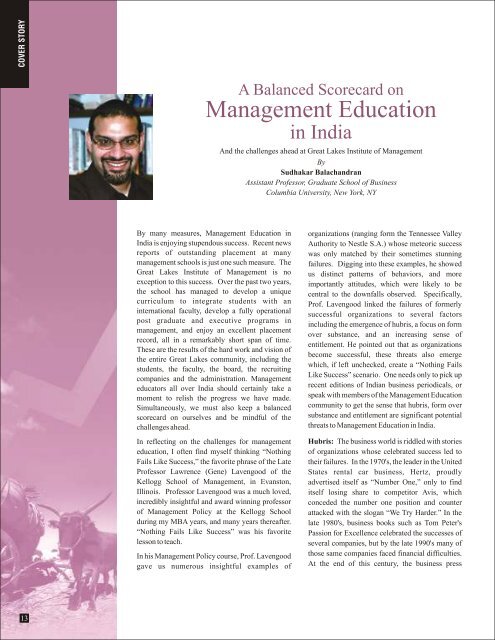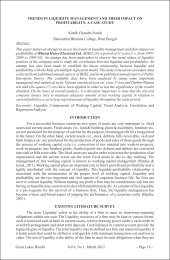Gravity Magazine_Final - Great Lakes
Gravity Magazine_Final - Great Lakes
Gravity Magazine_Final - Great Lakes
Create successful ePaper yourself
Turn your PDF publications into a flip-book with our unique Google optimized e-Paper software.
COVER STORY<br />
13<br />
A Balanced Scorecard on<br />
Management Education<br />
in India<br />
By many measures, Management Education in<br />
India is enjoying stupendous success. Recent news<br />
reports of outstanding placement at many<br />
management schools is just one such measure. The<br />
<strong>Great</strong> <strong>Lakes</strong> Institute of Management is no<br />
exception to this success. Over the past two years,<br />
the school has managed to develop a unique<br />
curriculum to integrate students with an<br />
international faculty, develop a fully operational<br />
post graduate and executive programs in<br />
management, and enjoy an excellent placement<br />
record, all in a remarkably short span of time.<br />
These are the results of the hard work and vision of<br />
the entire <strong>Great</strong> <strong>Lakes</strong> community, including the<br />
students, the faculty, the board, the recruiting<br />
companies and the administration. Management<br />
educators all over India should certainly take a<br />
moment to relish the progress we have made.<br />
Simultaneously, we must also keep a balanced<br />
scorecard on ourselves and be mindful of the<br />
challenges ahead.<br />
In reflecting on the challenges for management<br />
education, I often find myself thinking “Nothing<br />
Fails Like Success,” the favorite phrase of the Late<br />
Professor Lawrence (Gene) Lavengood of the<br />
Kellogg School of Management, in Evanston,<br />
Illinois. Professor Lavengood was a much loved,<br />
incredibly insightful and award winning professor<br />
of Management Policy at the Kellogg School<br />
during my MBA years, and many years thereafter.<br />
“Nothing Fails Like Success” was his favorite<br />
lesson to teach.<br />
In his Management Policy course, Prof. Lavengood<br />
gave us numerous insightful examples of<br />
And the challenges ahead at <strong>Great</strong> <strong>Lakes</strong> Institute of Management<br />
By<br />
Sudhakar Balachandran<br />
Assistant Professor, Graduate School of Business<br />
Columbia University, New York, NY<br />
organizations (ranging form the Tennessee Valley<br />
Authority to Nestle S.A.) whose meteoric success<br />
was only matched by their sometimes stunning<br />
failures. Digging into these examples, he showed<br />
us distinct patterns of behaviors, and more<br />
importantly attitudes, which were likely to be<br />
central to the downfalls observed. Specifically,<br />
Prof. Lavengood linked the failures of formerly<br />
successful organizations to several factors<br />
including the emergence of hubris, a focus on form<br />
over substance, and an increasing sense of<br />
entitlement. He pointed out that as organizations<br />
become successful, these threats also emerge<br />
which, if left unchecked, create a “Nothing Fails<br />
Like Success” scenario. One needs only to pick up<br />
recent editions of Indian business periodicals, or<br />
speak with members of the Management Education<br />
community to get the sense that hubris, form over<br />
substance and entitlement are significant potential<br />
threats to Management Education in India.<br />
Hubris: The business world is riddled with stories<br />
of organizations whose celebrated success led to<br />
their failures. In the 1970's, the leader in the United<br />
States rental car business, Hertz, proudly<br />
advertised itself as “Number One,” only to find<br />
itself losing share to competitor Avis, which<br />
conceded the number one position and counter<br />
attacked with the slogan “We Try Harder.” In the<br />
late 1980's, business books such as Tom Peter's<br />
Passion for Excellence celebrated the successes of<br />
several companies, but by the late 1990's many of<br />
those same companies faced financial difficulties.<br />
At the end of this century, the business press
















